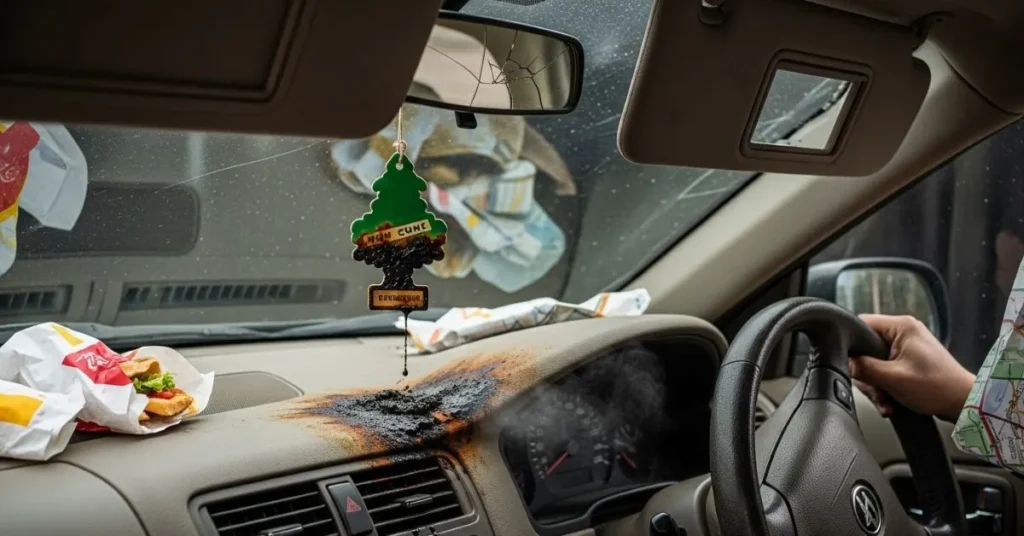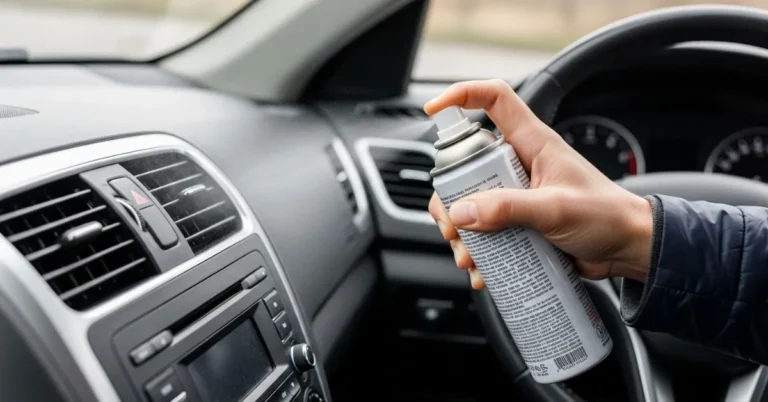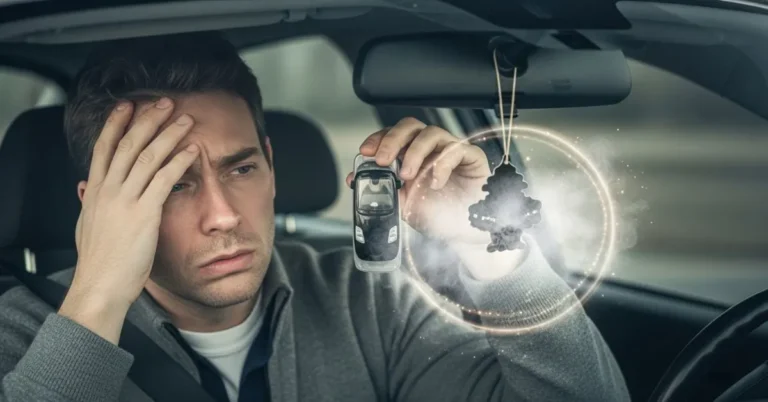
You know that feeling you slide into your car after a long day, maybe after a stressful commute or a weekend adventure, and suddenly you wonder: can car air fresheners damage your car? That subtle waft of your favourite scent the classic pine dangling from your rearview mirror or a delicate hint of vanilla from a vent clip is comforting, nostalgic, and instantly transforms your ride into a sanctuary. That burst of freshness might boost your mood, but it also sparks a common worry among drivers who want to preserve their vehicle’s interior and keep it looking flawless.
In this post, we’ll peel back the layers on car air fresheners what they’re made of, how they interact with your car’s interior, and whether that little burst of freshness could silently sabotage your investment. Along the way, we’ll explore safer alternatives, best usage tips, and how you can keep your car smelling amazing without worry.
Contents
- 1 What Exactly Are Car Air Fresheners Made Of?
- 1.1 Can Car Air Fresheners Damage Your Car’s Interior?
- 1.2 Can Car Air Fresheners Damage Your Car’s Air Conditioning and Ventilation System?
- 1.3 Different Types of Car Air Fresheners and Their Risks
- 1.4 Tips for Using Car Air Fresheners Safely
- 1.5 The Rise of Eco-Friendly and DIY Car Air Fresheners
- 1.6 Affordability vs. Quality: What’s Worth Your Money?
- 1.7 What to Do if Your Car Air Freshener Has Already Caused Damage
- 1.8 Frequently Asked Questions (FAQs)
- 1.9 Expert Thoughts: Can Car Air Fresheners Damage Your Car?
- 1.10 About the Author
What Exactly Are Car Air Fresheners Made Of?
To understand if car air fresheners can cause damage, we first need to look under the hood figuratively. What’s inside that colourful little tree, gel cup, or vent clip?
Traditional car air fresheners often rely on a cocktail of:
- Fragrance oils can be synthetic or natural compounds designed to give that lasting scent. Synthetic oils are cheaper and stronger but may contain chemicals that aren’t the friendliest to your car’s interior or lungs. Natural essential oils are gentler but typically pricier.
- Solvents: These help the fragrance oils evaporate into the air. Many solvents are chemical compounds that can interact with surfaces.
- Preservatives and stabilisers: To keep the product stable over time, preventing spoilage or evaporation before use.
- Volatile Organic Compounds (VOCs): Many air fresheners emit VOCs, which easily evaporate at room temperature and create their fragrance. However, they can also irritate sensitive people and possibly degrade car materials over time.
Recently, the industry has shifted towards more eco-conscious formulations using essential oils, plant-based solvents, and biodegradable packaging. These newer fresheners aim to offer the sensory joy of a fresh car without compromising your health or your vehicle.
Can Car Air Fresheners Damage Your Car’s Interior?
Here’s where the rubber meets the road. Many drivers wonder, “Can car air fresheners damage your car’s upholstery, dashboard, or trim?” The honest answer is a cautious yes, but only under certain conditions.
How Damage Happens
- Staining and Discolouration: Hanging fresheners soaked in concentrated fragrance oils can leak if exposed to heat or over time. This oily residue can leave stubborn stains on fabric seats or cause discolouration on plastic and vinyl dashboards.
- Surface Deterioration: Some of the solvents and chemicals in air fresheners can slowly degrade plastics and synthetic materials, making them brittle or causing them to lose their original shine.
- Sticky Residues: Air fresheners sometimes leave behind a sticky film that collects dust and dirt, dulling the look of interior surfaces and making them harder to clean.
- Fading from Sun Exposure: Chemical exposure and sunlight can accelerate fading or cracking, especially on dashboards and door panels.
Is All Freshener Use Risky?
Not necessarily. Minor, occasional use in a well-ventilated vehicle, and careful placement away from direct sunlight or sensitive surfaces significantly reduces risk. Many gel-based or essential oil diffusers are designed to minimise leakage and chemical impact.
Raed More: Are Air Fresheners Illegal in Cars in the USA?
Can Car Air Fresheners Damage Your Car’s Air Conditioning and Ventilation System?
Beyond your car’s interior surfaces, the air conditioning system is also vulnerable. You might not think about it, but spraying or clipping fragrances directly onto vents can cause buildup inside your ducts.
Possible Problems Include:
- Clogged Air Filters: Oils and freshener chemicals can clog the cabin air filter, reducing airflow and causing unpleasant odours.
- Vent Blockage: Over time, sticky residues can accumulate inside vents, making them harder to clean and potentially affecting airflow.
- Mould and Mildew Growth: Some fragrances mask moisture that collects in air ducts, which can encourage mould growth, leading to musty smells and health risks.
How to Prevent Damage to the Ventilation System
- Use vent clip fresheners sparingly and replace them as recommended.
- Avoid spraying aerosols directly into vents.
- Regularly clean and replace cabin air filters.
Different Types of Car Air Fresheners and Their Risks
When thinking, “Can car air fresheners damage your car?” the type of freshener matters a lot. Let’s break down the most common varieties:
1. Hanging Cardboard Trees
The classic pine tree shape is iconic, but it is often soaked in synthetic fragrance oils. If left in hot cars or placed near fabric, the oils can drip and stain. The chemicals in them are sometimes harsh and can degrade nearby surfaces.
2. Gel Fresheners
These fresheners contain a gel base infused with fragrance. They tend to release scent more slowly and are less prone to leaking, but some gels can leave sticky residues on surfaces they touch.
3. Vent Clip Diffusers
These attach directly to your air vents and release fragrance when air flows through. While effective, the oils can accumulate in the vents and filters over time, increasing maintenance needs.
4. Aerosol Sprays
They are great for quick bursts of freshness but contain high concentrations of solvents and chemicals. Frequent use can affect air quality inside the car and potentially damage surfaces with repeated exposure.
5. Essential Oil Diffusers
A newer trend is that these often use natural oils with fewer chemicals and are generally safer for your car and your health. They tend to be more expensive but are a smart choice for sustainability and safety.
Tips for Using Car Air Fresheners Safely
You don’t have to swear off car air fresheners to protect your vehicle. Instead, follow these expert tips to keep your ride fresh and safe:
- Avoid direct sunlight: Heat accelerates chemical release and leakage. Hang fresheners away from windows or dashboards.
- Choose natural or low-chemical fresheners: Look for products made with essential oils or labelled low VOC.
- Don’t overdo it: One or two fresheners at a time is plenty. Excess fragrance doesn’t mean fresher—it just increases exposure to chemicals.
- Regularly inspect and replace: Old fresheners can dry out, crack, or leak, increasing the risk.
- Clean your car interior regularly: Wipe down surfaces and vacuum upholstery to prevent buildup.
- Maintain your ventilation system: Change cabin air filters and clean vents to avoid residue and mould buildup.
The Rise of Eco-Friendly and DIY Car Air Fresheners
Environmental consciousness and health concerns have driven many drivers to seek greener options. Eco-friendly fresheners are on the rise, boasting:
- Biodegradable materials
- Essential oil-based scents
- Refillable or reusable designs
You can also make your car freshener at home, using simple ingredients like:
- Baking soda mixed with essential oils in a small jar
- Cotton balls with drops of lavender, peppermint, or citrus oils
- Activated charcoal pouches that absorb odours naturally
These DIY options avoid chemicals altogether, are affordable, and give you total control over your car’s scent profile.
Affordability vs. Quality: What’s Worth Your Money?
The price tag on fresheners doesn’t always guarantee safety. Some cheap fresheners may contain harsh chemicals, while pricier products might be more natural but require caution.
Smart shopping means:
- Checking ingredient lists (avoid synthetic chemicals and high VOCs)
- Reading reviews for scent longevity and product safety
- Choosing brands committed to sustainability and transparency
Remember, your car’s health and well-being are worth an extra investment.
What to Do if Your Car Air Freshener Has Already Caused Damage
If you suspect damage, don’t despair! Here’s how to tackle it:
- Use a gentle upholstery cleaner, a water solution, and mild soap for stains. Blot, don’t rub, to avoid spreading.
- For sticky residues: Microfiber cloths with rubbing alcohol or dedicated plastic cleaners can help remove buildup.
- For plastic discolouration: While some fading is permanent, applying dashboard conditioners or protectants can restore shine and add a protective layer.
- For odours: Air out your car and consider professional detailing if smells persist.
Raed More: Are Little Trees Car Air Fresheners Toxic to Humans?
Frequently Asked Questions (FAQs)
1. Can car air fresheners damage leather seats?
Yes. Some synthetic chemicals can dry out or stain leather. Use natural fresheners and wipe spills immediately.
2. Are essential oil diffusers safe for cars?
Yes, generally. They use natural oils and fewer chemicals, but should still be used carefully to avoid spills.
3. How often should I replace my car air freshener?
Every 2 to 4 weeks is typical. Old fresheners lose scent and can increase residue buildup.
4. Do all air fresheners contain harmful chemicals?
No. Many modern products use safer, natural ingredients, but some traditional fresheners contain VOCs and synthetic scents.
5. What’s the safest way to keep my car smelling fresh?
Good ventilation, regular cleaning, and natural or DIY fresheners minimise damage risk and improve air quality.
Expert Thoughts: Can Car Air Fresheners Damage Your Car?
So, can car air fresheners damage your vehicle? The answer depends on what type you use, how often, and how carefully. With proper choice and usage, you can enjoy fresh scents without worry.
Opting for natural, low-chemical products and following simple precautions protects your car’s interior and ventilation system. Plus, regular cleaning and maintenance go a long way.
Your car is more than just transportation it’s your space. Treat it well, and it will reward you with years of comfort, style, and a nice-smelling ride.




